steering Citroen JUMPY MULTISPACE 2013 2.G Owner's Manual
[x] Cancel search | Manufacturer: CITROEN, Model Year: 2013, Model line: JUMPY MULTISPACE, Model: Citroen JUMPY MULTISPACE 2013 2.GPages: 260, PDF Size: 8.79 MB
Page 4 of 260
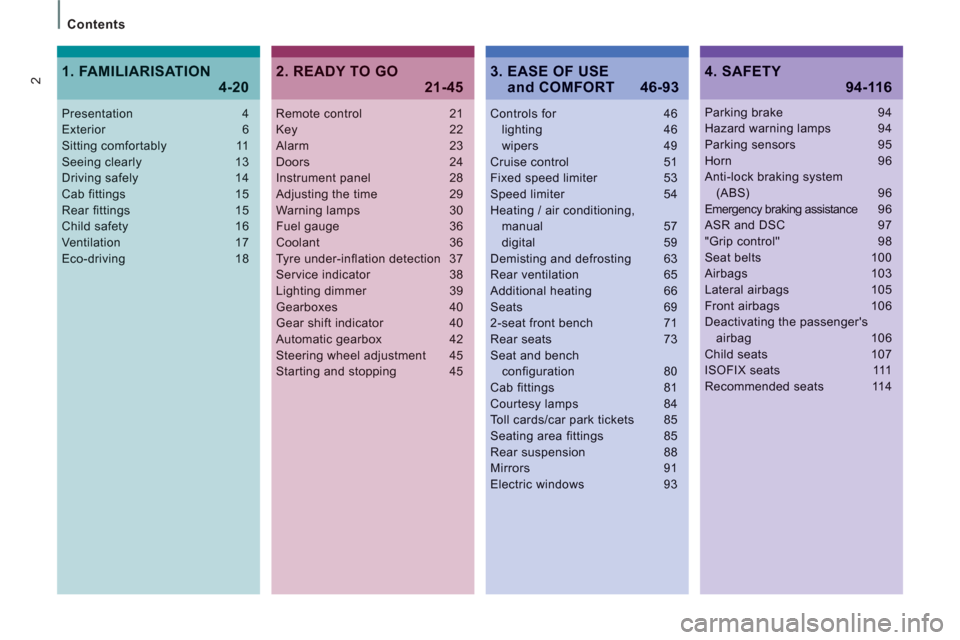
2
Contents
Remote control 21Key 22Alarm 23Doors 24Instrument panel 28Adjusting the time 29Warning lamps 30Fuel gauge 36Coolant 36Tyre under-inflation detection 37Service indicator 38Lighting dimmer 39Gearboxes 40Gear shift indicator 40Automatic gearbox 42Steering wheel adjustment 45Starting and stopping 45
Controls for 46lighting 46wipers 49Cruise control 51Fixed speed limiter 53Speed limiter 54Heating / air conditioning,manual 57digital 59Demisting and defrosting 63Rear ventilation 65Additional heating 66Seats 692-seat front bench 71Rear seats 73Seat and bench configuration 80Cab fittings 81Courtesy lamps 84Toll cards/car park tickets 85
Seating area fittings 85Rear suspension 88Mirrors 91Electric windows 93
Presentation 4Exterior 6Sitting comfortably 11Seeing clearly 13Driving safely 14Cab fittings 15Rear fittings 15Child safety 16Ventilation 17Eco-driving 18
Parking brake 94Hazard warning lamps 94Parking sensors 95Horn 96Anti-lock braking system(ABS) 96Emergency braking assistance96ASR and DSC 97"Grip control" 98Seat belts 100Airbags 103Lateral airbags 105Front airbags 106Deactivating the passenger'sairbag 106Child seats 107ISOFIX seats 111Recommended seats 114
2. READY TO GO
21-45
4. SAFETY
94-116
1. FAMILIARISATION
4-203. EASE OF USE and COMFORT 46-93
Page 11 of 260
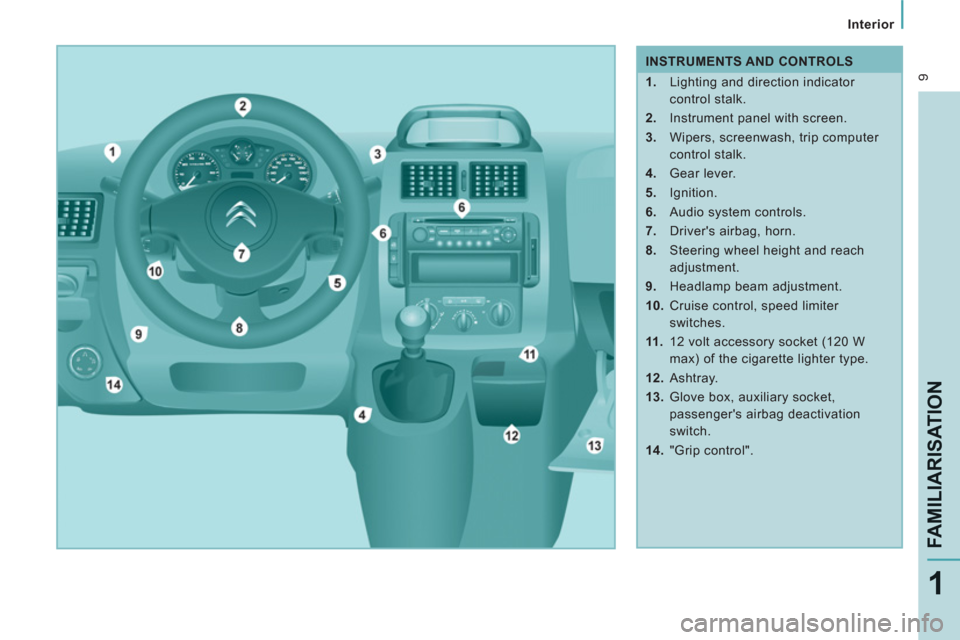
9
Interior
FAMILIARISATIO
N
1
INSTRUMENTS AND CONTROLS
1.
Lighting and direction indicator
control stalk.
2.
Instrument panel with screen.
3.
Wipers, screenwash, trip computer
control stalk.
4.
Gear lever.
5.
Ignition.
6.
Audio system controls.
7.
Driver's airbag, horn.
8.
Steering wheel height and reach
adjustment.
9.
Headlamp beam adjustment.
10.
Cruise control, speed limiter
switches.
11 .
12 volt accessory socket (120 W
max) of the cigarette lighter type.
12.
Ashtray.
13.
Glove box, auxiliary socket,
passenger's airbag deactivation
switch.
14.
"Grip control".
Page 14 of 260
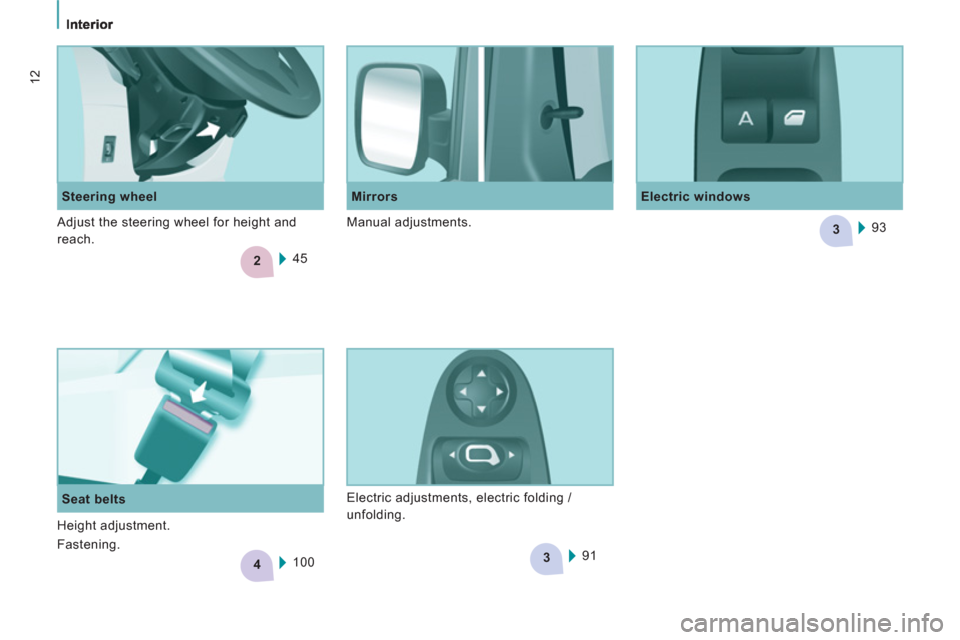
2
4
3
3
12
Steering wheel
Electric windows
Mirrors
45
Seat belts
100 93
91 Adjust the steering wheel for height and
reach. Manual adjustments.
Electric adjustments, electric folding /
unfolding.
Height adjustment.
Fastening.
Page 32 of 260
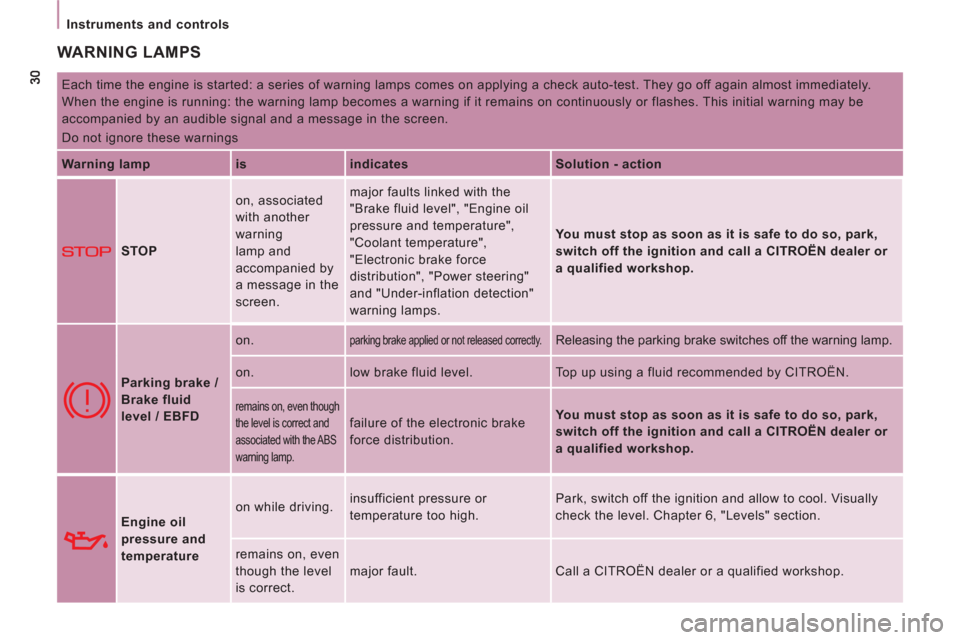
Instruments and controls
WARNING LAMPS
Each time the engine is started: a series of warning lamps comes on applying a check auto-test. They go off again almost immediately.
When the engine is running: the warning lamp becomes a warning if it remains on continuously or flashes. This initial warning may be
accompanied by an audible signal and a message in the screen.
Do not ignore these warnings
Warning lamp
is
indicates
Solution - action
STOP on, associated
with another
warning
lamp and
accompanied by
a message in the
screen. major faults linked with the
"Brake fluid level", "Engine oil
pressure and temperature",
"Coolant temperature",
"Electronic brake force
distribution", "Power steering"
and "Under-inflation detection"
warning lamps.
You must stop as soon as it is safe to do so, park,
switch off the ignition and call a CITROËN dealer or
a qualified workshop.
Parking brake /
Brake fluid
level / EBFD on.
parking brake applied or not released correctly.
Releasing the parking brake switches off the warning lamp.
on. low brake fluid level. Top up using a fluid recommended by CITROËN.
remains on, even though
the level is correct and
associated with the ABS
warning lamp.
failure of the electronic brake
force distribution.
You must stop as soon as it is safe to do so, park,
switch off the ignition and call a CITROËN dealer or
a qualified workshop.
Engine oil
pressure and
temperature on while driving. insufficient pressure or
temperature too high. Park, switch off the ignition and allow to cool. Visually
check the level. Chapter 6, "Levels" section.
remains on, even
though the level
is correct. major fault. Call a CITROËN dealer or a qualified workshop.
Page 35 of 260
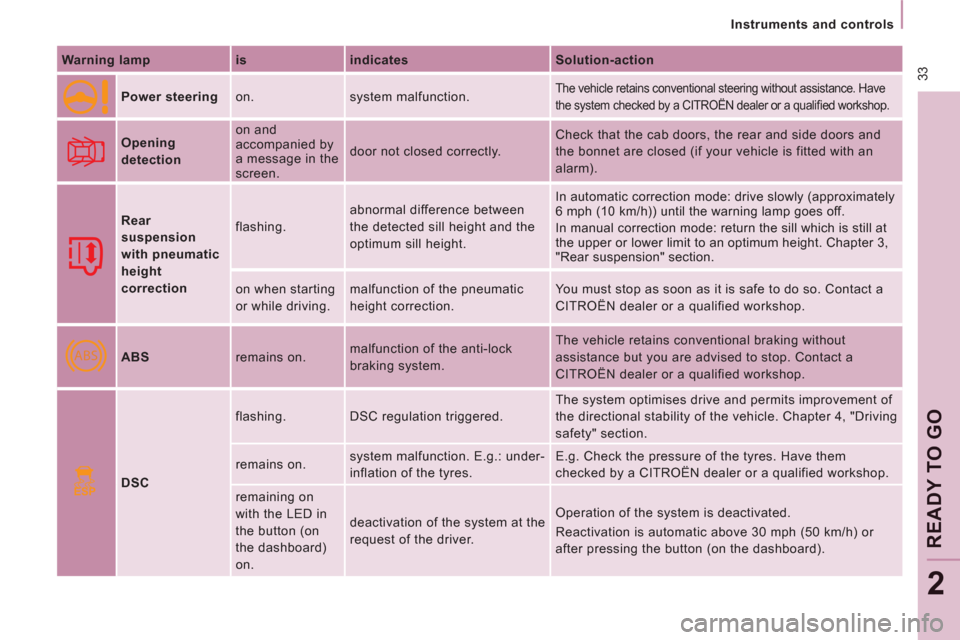
ABS
ESP
33
Instruments and controls
REA
DY
TO GO
2
Warning lamp
is
indicates
Solution-action
Power steering on. system malfunction.
The vehicle retains conventional steering without assistance. Have
the system checked by a CITROËN dealer or a qualifi ed workshop.
Opening
detection on and
accompanied by
a message in the
screen. door not closed correctly. Check that the cab doors, the rear and side doors and
the bonnet are closed (if your vehicle is fitted with an
alarm).
Rear
suspension
with pneumatic
height
correction flashing. abnormal difference between
the detected sill height and the
optimum sill height. In automatic correction mode: drive slowly (approximately
6 mph (10 km/h)) until the warning lamp goes off.
In manual correction mode: return the sill which is still at
the upper or lower limit to an optimum height. Chapter 3,
"Rear suspension" section.
on when starting
or while driving. malfunction of the pneumatic
height correction. You must stop as soon as it is safe to do so. Contact a
CITROËN dealer or a qualified workshop.
ABS remains on. malfunction of the anti-lock
braking system. The vehicle retains conventional braking without
assistance but you are advised to stop. Contact a
CITROËN dealer or a qualified workshop.
DSC flashing. DSC regulation triggered. The system optimises drive and permits improvement of
the directional stability of the vehicle. Chapter 4, "Driving
safety" section.
remains on. system malfunction. E.g.: under-
inflation of the tyres. E.g. Check the pressure of the tyres. Have them
checked by a CITROËN dealer or a qualified workshop.
remaining on
with the LED in
the button (on
the dashboard)
on. deactivation of the system at the
request of the driver. Operation of the system is deactivated.
Reactivation is automatic above 30 mph (50 km/h) or
after pressing the button (on the dashboard).
Page 36 of 260
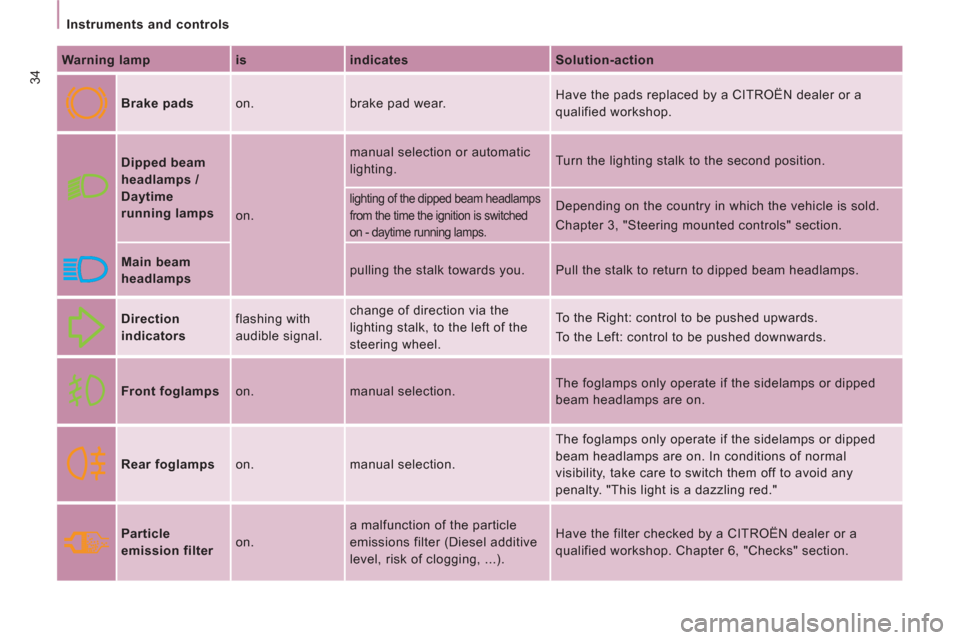
34
Instruments and controls
Warning lamp
is
indicates
Solution-action
Brake pads on. brake pad wear. Have the pads replaced by a CITROËN dealer or a
qualified workshop.
Dipped beam
headlamps /
Daytime
running lamps
on. manual selection or automatic
lighting. Turn the lighting stalk to the second position.
lighting of the dipped beam headlamps
from the time the ignition is switched
on - daytime running lamps. Depending on the country in which the vehicle is sold.
Chapter 3, "Steering mounted controls" section.
Main beam
headlamps pulling the stalk towards you. Pull the stalk to return to dipped beam headlamps.
Direction
indicators flashing with
audible signal. change of direction via the
lighting stalk, to the left of the
steering wheel. To the Right: control to be pushed upwards.
To the Left: control to be pushed downwards.
Front foglamps on. manual selection. The foglamps only operate if the sidelamps or dipped
beam headlamps are on.
Rear foglamps on. manual selection. The foglamps only operate if the sidelamps or dipped
beam headlamps are on. In conditions of normal
visibility, take care to switch them off to avoid any
penalty. "This light is a dazzling red."
Particle
emission filter on. a malfunction of the particle
emissions filter (Diesel additive
level, risk of clogging, ...). Have the filter checked by a CITROËN dealer or a
qualified workshop. Chapter 6, "Checks" section.
Page 37 of 260
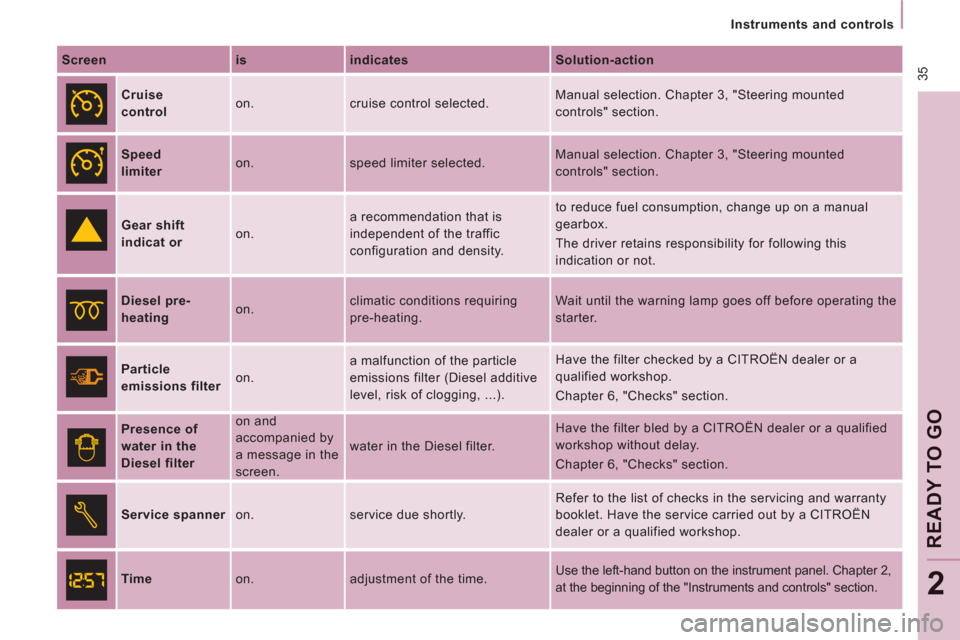
35
Instruments and controls
REA
DY
TO GO
2
Screen
is
indicates
Solution-action
Cruise
control on. cruise control selected. Manual selection. Chapter 3, "Steering mounted
controls" section.
Speed
limiter on. speed limiter selected. Manual selection. Chapter 3, "Steering mounted
controls" section.
Gear shift
indicat
or on. a recommendation that is
independent of the traffic
configuration and density. to reduce fuel consumption, change up on a manual
gearbox.
The driver retains responsibility for following this
indication or not.
Diesel pre-
heating on. climatic conditions requiring
pre-heating. Wait until the warning lamp goes off before operating the
starter.
Particle
emissions filter on. a malfunction of the particle
emissions filter (Diesel additive
level, risk of clogging, ...). Have the filter checked by a CITROËN dealer or a
qualified workshop.
Chapter 6, "Checks" section.
Presence of
water in the
Diesel filter on and
accompanied by
a message in the
screen. water in the Diesel filter. Have the filter bled by a CITROËN dealer or a qualified
workshop without delay.
Chapter 6, "Checks" section.
Service spanner
on. service due shortly.
Refer to the list of checks in the servicing and warranty
booklet. Have the service carried out by a CITROËN
dealer or a qualified workshop.
Time on. adjustment of the time. Use the left-hand button on the instrument panel. Chapter 2,
at the beginning of the "Instruments and controls" section.
Page 39 of 260
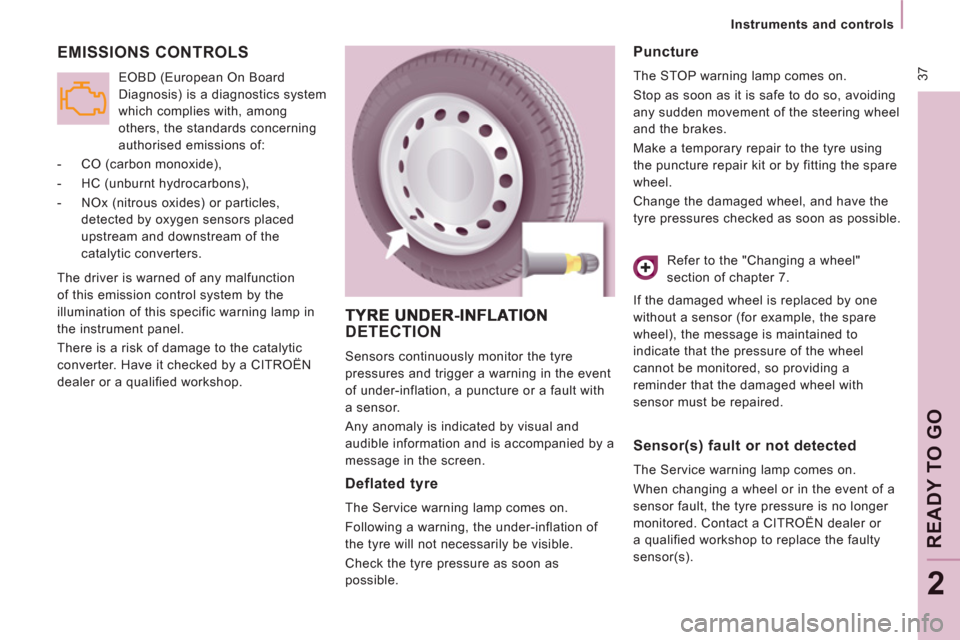
37
Instruments and controls
REA
DY
TO GO
2
EMISSIONS CONTROLS
The driver is warned of any malfunction
of this emission control system by the
illumination of this specific warning lamp in
the instrument panel.
There is a risk of damage to the catalytic
converter. Have it checked by a CITROËN
dealer or a qualified workshop.
EOBD (European On Board
Diagnosis) is a diagnostics system
which complies with, among
others, the standards concerning
authorised emissions of:
- CO (carbon monoxide),
- HC (unburnt hydrocarbons),
- NOx (nitrous oxides) or particles,
detected by oxygen sensors placed
upstream and downstream of the
catalytic converters.
DETECTION
Sensors continuously monitor the tyre
pressures and trigger a warning in the event
of under-inflation, a puncture or a fault with
a sensor.
Any anomaly is indicated by visual and
audible information and is accompanied by a
message in the screen.
Deflated tyre
The Service warning lamp comes on.
Following a warning, the under-inflation of
the tyre will not necessarily be visible.
Check the tyre pressure as soon as
possible.
Puncture
The STOP warning lamp comes on.
Stop as soon as it is safe to do so, avoiding
any sudden movement of the steering wheel
and the brakes.
Make a temporary repair to the tyre using
the puncture repair kit or by fitting the spare
wheel.
Change the damaged wheel, and have the
tyre pressures checked as soon as possible.
Sensor(s) fault or not detected
The Service warning lamp comes on.
When changing a wheel or in the event of a
sensor fault, the tyre pressure is no longer
monitored. Contact a CITROËN dealer or
a qualified workshop to replace the faulty
sensor(s). Refer to the "Changing a wheel"
section of chapter 7.
If the damaged wheel is replaced by one
without a sensor (for example, the spare
wheel), the message is maintained to
indicate that the pressure of the wheel
cannot be monitored, so providing a
reminder that the damaged wheel with
sensor must be repaired.
Page 42 of 260
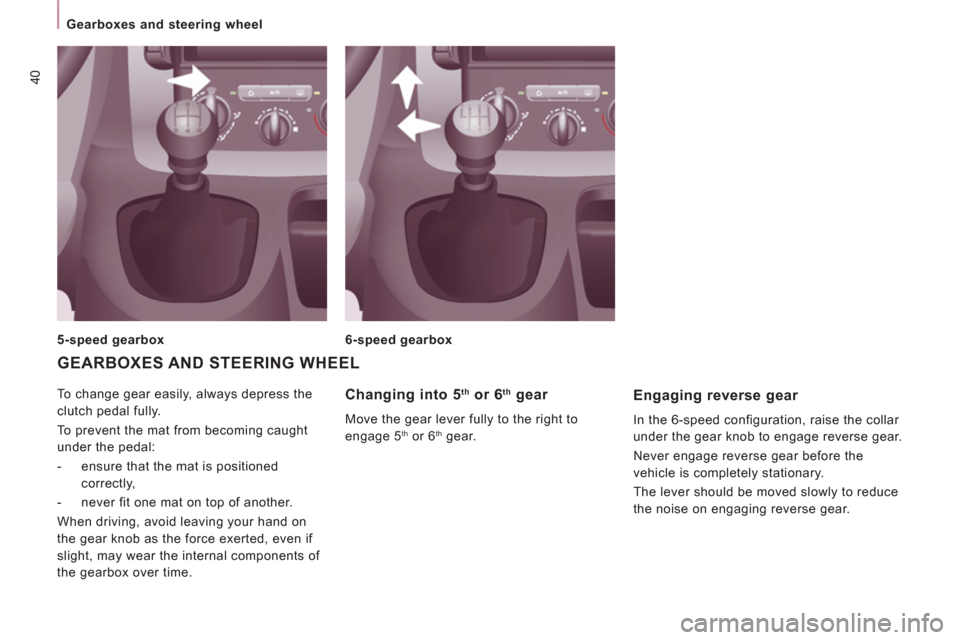
40
Gearboxes and steering wheel
To change gear easily, always depress the
clutch pedal fully.
To prevent the mat from becoming caught
under the pedal:
- ensure that the mat is positioned
correctly,
- never fit one mat on top of another.
When driving, avoid leaving your hand on
the gear knob as the force exerted, even if
slight, may wear the internal components of
the gearbox over time.
GEARBOXES AND STEERING WHEEL
5-speed gearbox
6-speed gearbox
Changing into 5 th
or 6 th
gear
Move the gear lever fully to the right to
engage 5 th or 6 th
gear.
Engaging reverse gear
In the 6-speed configuration, raise the collar
under the gear knob to engage reverse gear.
Never engage reverse gear before the
vehicle is completely stationary.
The lever should be moved slowly to reduce
the noise on engaging reverse gear.
Page 43 of 260
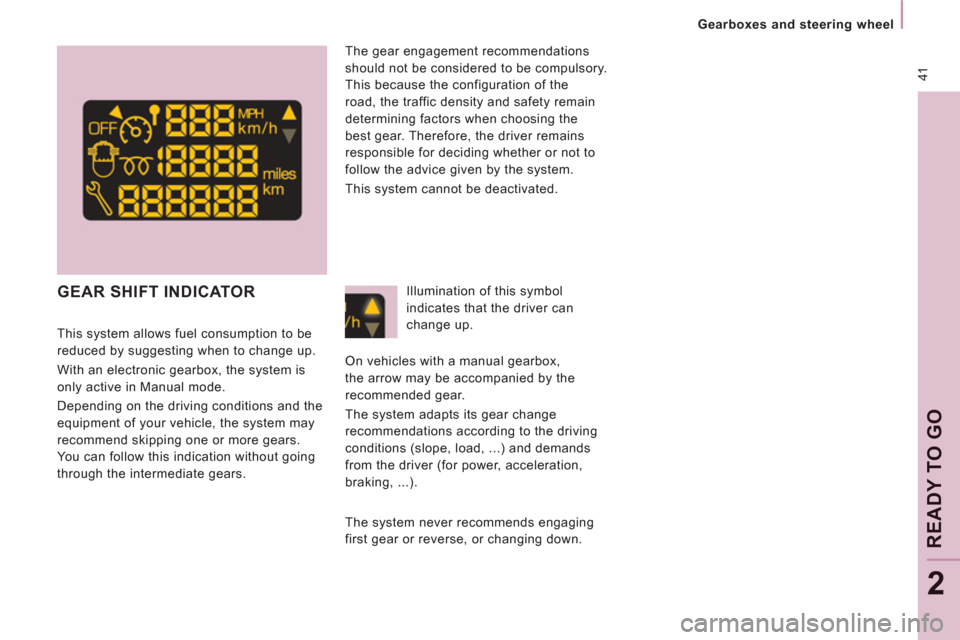
41
Gearboxes and steering wheel
REA
DY
TO GO
2
GEAR SHIFT INDICATOR
This system allows fuel consumption to be
reduced by suggesting when to change up.
With an electronic gearbox, the system is
only active in Manual mode.
Depending on the driving conditions and the
equipment of your vehicle, the system may
recommend skipping one or more gears.
You can follow this indication without going
through the intermediate gears.
Illumination of this symbol
indicates that the driver can
change up.
On vehicles with a manual gearbox,
the arrow may be accompanied by the
recommended gear.
The system adapts its gear change
recommendations according to the driving
conditions (slope, load, ...) and demands
from the driver (for power, acceleration,
braking, ...).
The system never recommends engaging
first gear or reverse, or changing down.
The gear engagement recommendations
should not be considered to be compulsory.
This because the configuration of the
road, the traffic density and safety remain
determining factors when choosing the
best gear. Therefore, the driver remains
responsible for deciding whether or not to
follow the advice given by the system.
This system cannot be deactivated.